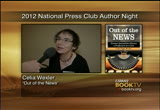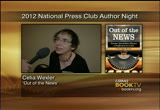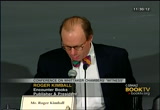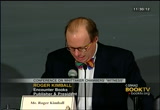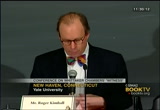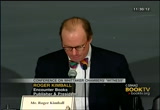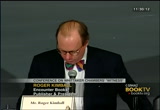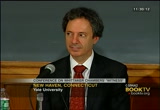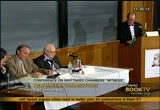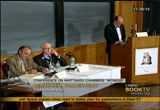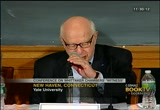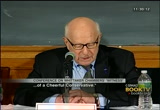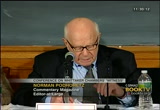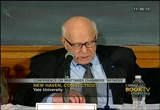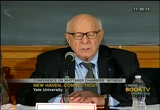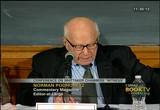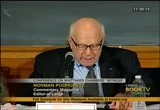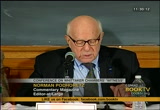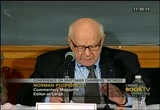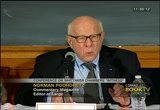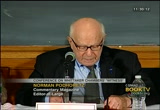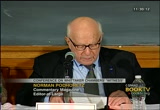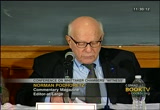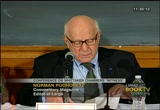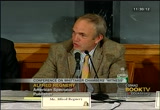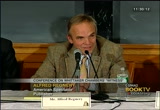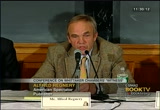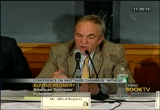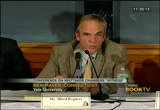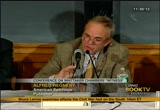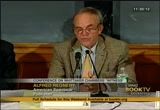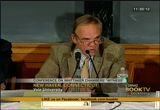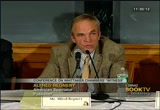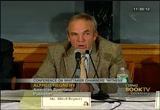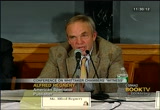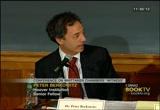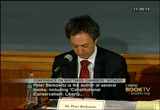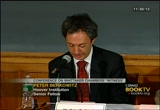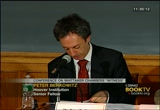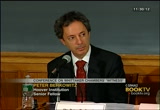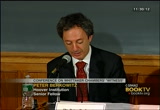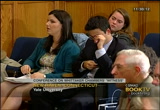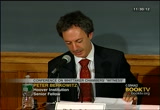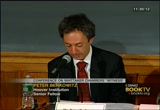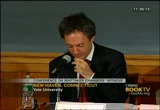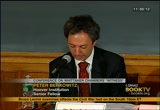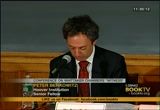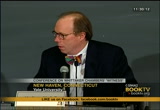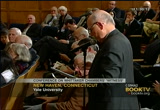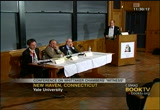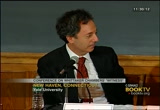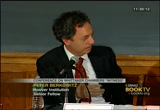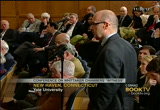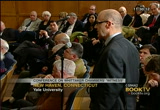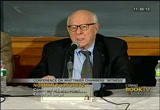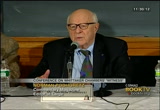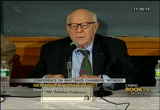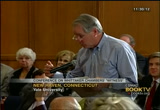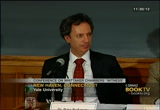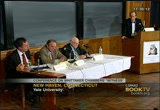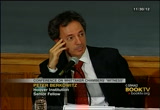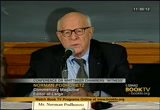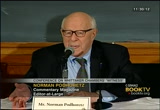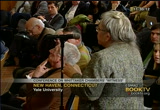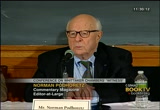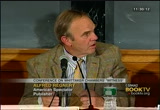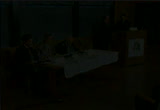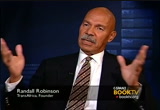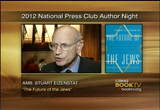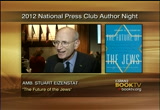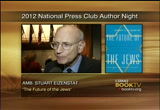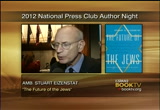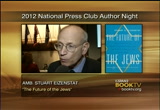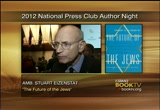tv Book TV CSPAN January 20, 2013 7:30am-8:45am EST
7:30 am
journalism is not dead, that the future of journalism is a little uncertain. but the need for journalism continues. >> you profile and 11 journalists. i should say former journalists, and this book. what is different now in today's contemporary landscape in journalism and media than when you are a journalist? >> i think the biggest difference is that we are 24/7, so that right now journalists don't have much time at all. there never was a lot of time to go see, explore and be thoughtful. but now it's all about breaking news. so that's a big difference. there's also, there's not a lot of opportunity for journalists to learn and grow and become more proficient and more knowledgeable. and i think that's the difference now, also. >> was there something you heard
7:31 am
from all 11 journalists that resonated with you as regards to why they left the profession state was i think most of them if not all of them said basically i wanted to do more. >> would you ever come back to journalism? >> i'm not sure. i love writing. i love writing this book. i think it's more likely i would do another book. >> if you're a former journalist or if you're interested in the profession, celia wexler is the author of "out of the news." thanks so much. >> thank you. >> and now from a conference on the 60th anniversary of the publication of whittaker chambers "witness," a panel entitled "without anti-communism: what defines conservatives today?." >> so, couldn't help remember,
7:32 am
someone was talking about the adulation the world held -- unless everyone here is aware that august educational institute not too far from here, i mean bard college, there's actually an alger hiss chair inhumanities. my colleague, hilton kramer, the founding editor, had an honorary degree from bard when this new chair inhumanities was pronounced. he probably gave it back to the president. well, i'm delighted to welcome you to our final panel commemorating the 60th anniversary of whittaker chambers "witness." and i think we saved the most difficult or at least the most contentious question for last. what defines conservatives tod
7:33 am
today? i think in the context of "witness" and the work of bill buckley, today means after the cold war. he said a little bit about that already this afternoon. but i'd like to say a little more about it, little more succinct way about it now. so after the cold war, that means after the implacable confrontation of communism by the evil empire, the soviet union and the west. in his preparatory letter to his children are which has been mentioned already, chambers said that in communism he saw quote the concentrated evil of our time. bill buckley looked with kindred eyes upon the enormity of communism. indeed, conservatives of all
7:34 am
stripes could agree about hideousness of the communist system, which is why the world of the cold war was in many ways a tidier, more manichaean world than the one that we inhabited. whatever might be said about her, the soviet union provided a sort of negative rallying point, something that conservatives to find themselves against. and i wonder about today, what about today, how do conservatives define themselves? well, that's a question that i hope the panel is going to conjure with, and before turning things over to them, i want to make just two brief, two final points. one of which was raised a couple times this afternoon. if conservatives were virtually at one, regarding the freedom liking ideology of communism,
7:35 am
they were not i believe quite so unified in understanding communism as did thinkers like chambers and buckley. chambers readily acknowledge the familiar features of communism, the gulags and so when. but he went further. communism, he said, was a vision of man without god. we've had that a couple of times today. i want to emphasize that. that's the core of the phenomenon. it was an elaboration of deceptive promise, said chambers, that was made in the garden of eden, relinquish god, and follow me, said the serpent, and he shall be as gods. that was the existential catnip that fueled the deep appeal of communism, and it is, as still recognize, and appealed that survived the demise of the soviet empire.
7:36 am
you remember that in god and man in jail was one of the most famous lines there is that he said i believe the struggle between communism and atheism is the most important in the world, and then this striking console. and that the struggle between individualism and collectivism is the same struggle on a different level. now, exactly how conservatives have dealt and should deal without survival, survival is part of what we are charged with discussing on this panel. how do conservatives understand themselves today absent that manichaean, that manichaean threat. the late irving kristol, a friend of many of us here, summed up our situation with his customary insights and elegance when he said in an essay written shortly after the collapse of the soviet union, and i'm quoting now, there is no after
7:37 am
the cold war for me. so far having ended, my cold war, said crystal, has increased in intensity of sector after sector of american life has been ruthlessly corrupted by the athens. it is an f. us that aims for at political and social elected us in on the one hand, and moral anarchy on the other. you cannot win, but they can make us all losers. to meditate on the meaning of this great contest, we've assembled a distinguished panel of chambers intellectual and moral affairs. you berkowitz is the current senior fellow at the hoovery/ institution where he chairs theo hoover task force on national security and law, and co-chairsk the hoover task force on the virtues of a free society. in the past he served as an
7:38 am
associate professor at george mason university school of law, and an assistant and associate professor at harvard university. he is the author of virtue and the making of modern liberalism. he holds a jd and a ph.d inñs political science from thisvç institution, an m.a. from hebrew university of jerusalem, and a ba in english literature from swarthmore college. norman podhoretz -- i feel silly introducing these people -- norman podhoretz served as editor-in-chief of "commentary" magazine from 1960-1995, and is their current editor at large. he was awarded the presidential medal of freedom by george w. bush. he served as a senior fellow at the hudson institute and was a senior fellow, and he's the
7:39 am
author of many books, and articles including the bush doctrine, what the president said and what it means, world war for. and why are liberal? which should have been entitled why archie is still liberal? he was a pulitzer prize call at colombia university where he urges statute of large in 1950, in the also holds a bachelors and masters degree from cambridge university england where he was a fulbright scholar and a fellow. in addition he has a bachelors degree in hebrew literature from the jewish theological seminary. alfred regnery is managing director of the a new incident called the paul revere project, and you can occasions initiative, and is chairman of the intercollegiate studies institute. he was for many years that distinguished publisher of the american scholar.
7:40 am
he took -- "american spectator," sorry. a once -- that he breathed new life into. and he's the former president and publisher of regnery publishing, of course which originally published "witness." mr. regnery served in the department of justice during the reagan administration as deputy assistant attorney general, and has administrator of the office of juvenile justice into a wiki prevention. he has published many articles and his new book is upstream, the descendents of american conservatism, published in 2008. now, norman podhoretz is asked to speak for so i like to offer him before. norman podhoretz. spent thanks, roger. as was mentioned i made a vow never to set foot on a college campus again after a number of nasty experiences at a number of
7:41 am
college campuses. and i now understand why the day of atonement begins for jews with a disavowal of vowels broken. i was forced by the persuasive young people to break a vow, and i'll have to seek atonement in due course. in any case, for any reason that will become clear in a moment, it's from the perspective of neoconservatism that want to talk about conservatism without anti-communism. now, as one of the godfather's, along with irving kristol, i've been a neoconservatism -- neoconservatives for so long i should probably be called a paley o'neill conservatives. [laughter] but as the prefix neo indicates, i and the other neoconservative intellectuals of the first generation were new to
7:42 am
conservatism, having begun our political lives somewhere on the left. this than linksys more closely to what it could chambers than bill buckley, who was of course to the manor born. but it was another and even stronger link to whittaker chambers in the force that drove most of us out of the left and into the right. that force was anti-communism. now to be sure, unlike chambers, none of us has been a stalinist let alone a soviet agent. a few have been liberals, and a few, myself included, have been associated with the new left. nevertheless, we were all scarcely less passionate in our anti-communism and chambers himself. we, too, saw communism as an absolute evil, fully comparable, but even more dangerous because of its far greater appeal to
7:43 am
many more people than knotts is in that effort exerted. accordingly, we felt it upon ourselves a moral obligation to fight with all our intellectual might against communism in the world of ideas. and against its spread through the military power of the soviet union. so far, so chambers liked, but we parted company with chambers when it came to the force, the only force capable of holding the spirit of soviet power, and in this way, helped strangle the ideological cause of served by that power. i'm going to quote again was been quoted several times. chambers' famous remarks to his wife about his break from communism. i know that i'm leaving the winning side for the losing side, but it is better to die on the losing side than to live under communism.
7:44 am
now, i, for one, and most of my fellow neoconservatives agreed with the second half of that declaration, which amounted to a defiant repudiation of what came to be inelegantly known as anti-anti-communism. and choose -- is identifying mark, at a red than dead. but he strongly rejected the idea that americans represented the losing side in the struggle against soviet expansionism and the timing is played that went with it. the anti-communist passion was shared with chambers was inseparable from make amends readily powerful love for and stay thin, the training of america and the civilization for which it had gone to war against the two great carriers of modern totalitarianism. first nazi germany and now communist russia. and unlike chambers, we believed that the united states would eventually turn back the timing
7:45 am
is threat to western civilization, just as surely as it had done to the equally evil threat posed by nazi germany. not, mind you, that we underestimate the might of the soviet military or the strength and resolve of the anti-anti-communist forces, the rate against us both at home and abroad. there were times we came close -- other conservative communists like james burnham wrote a book titled suicide of the west. we feared they might be right. for me, one especially discouraging education was the fight against ronald reagan's decision in 1983 to station a medium-range missiles in europe to counter the soviet buildup of similar missiles on his side of the dividing line between its domain and the west. massive protests were planned here at home and all over the world, with the biggest one
7:46 am
scheduled for the hague, to which over 1 million people from every country in western europe were streaming pipeline, by bus, and on foot. the dutch broadcasters have erected a glass booth overlooking the square to which the protesters were all marching, and they invited and ends from various european countries to sit there and comment on this great event. evidently, however, they were unable to find anyone in the whole of europe willing or able to support reagan's decision, which ish i repeat a panicky call at the last minute inviting me to participate, so desperate were they to spice up their discussion with anna from his action fascist, although i often played in those days, that he even offered to fly me over on the monstrously expensive concord. and so it came about that a few hours later i found myself
7:47 am
nearly a whole day against for religious opponents, five, if you count the moderator who made candy crowley seeing a moderator of partiality, all the while watching the biggest crowd i've ever seen or ever would see carrying anti-and american signs and chanting anti-american slogans. no wonder i felt neither suffers nor for the last time as if we anti-communist were all a loan and at the against the whole world, including that part of it we were dedicating defending. and that we could not possibly prevail against odds like that. thanks be to god, i was wrong. there were other occasions on which with great justification i felt just as really about our struggle in the world of ideas. by the 1970s the famous tactic of the anti-anti-communist was
7:48 am
not to defend communists, for that had become too hard to do even for actual communists, but to attack america. this country, they said, was oppressive and repressive at home, as witnessed the persistence of such evil as racism and poverty, and was also a force for evil in international affairs as witnessed at war in the amount and its opposition to any and every movement by the people to the third world to improve their lot. this particular species of anti-americanism began its long march through the institutions of american culture in the 1960s, as was mentioned earlier. and within amazingly short time, they had thoroughly affected to round up the usual suspects. the universities, the mainstream media, and the arts, both low and high. but it also had the unanticipated consequence of jolting some of us into a discovery, or in some cases a
7:49 am
rediscovery of the virtues that, as we now realize, made this country not nearly worth defending, but into something much more than that. i myself even went so far as to place america among the highest point of human civilization, on par with pinnacle in athens or the elite of the medicis or other cities in england, was a rush of tolstoy unlike them, america did not belong on that list because of its achievements in the arts. it belonged there because my remaining on the whole, loyal to the principles of firm and the declaration of independence, it had developed into a country in which there was more liberty and more prosperity, more widely shared than any other nation in the history of the world. if whittaker chambers had lived to hear it, he probably would have been shocked by that
7:50 am
statement. he most certainly did not partake to the anti-americanism of the left. but there was also bitter critique of america on the right, in which he most certainly did partake. this critique goes all the way back to the earliest days of the republic, and it focuses on what has been mentioned several times already, the alleged materialism of american life, the crassness of its culture and its supposedly indifference or hostility to things with the spirit. all of which was seem to flow from what tocqueville, even tocqueville called both the exclusively commercial habits that he claimed were bred in the american bowl. this is pretty much how whittaker chambers felt. and he became economy is because he had come to believe that the america she by its exclusively commercial habits, capitalism, nor did come had reached the end of its tether.
7:51 am
and that communism was the only alternative on offer with the vision and the power to save whatever might be worth salvaging out of a dying civilization. yet, when he finally discovered that the evils of communism were infinitely greater than those he attributed to capitalism, he did not, thereby, come to the conclusion that he been wrong about america. america under capitalism remained in his idea a society die of its own soullessness, which is why he could say that in breaking with communism he was leaving the winning side for the losing side. but he was leaving the side of evil for the side of good. and this is also why witnessed showed among the greatest books ever written about communism, is i'm afraid a little help as a guide to what conservatism can or should be without anti-communism.
7:52 am
for neither in witnessed nor in later years to chambers change his mind about the free market. indeed, he even preferred -- reading one of his colleagues on "national review" to complain that a talk and ongoing, as if the right must acquiesce and selfish needs and hopes of the nasty when the purpose of "national review" was to make the opposition case. it's a good thing then that -- that was willie pflaum, by the way. it's a good thing then that with the exception of a born-again column i'd like pat buchanan and his fellow conservatism without anti-communism has not followed and anti-capitalist footsteps of chambers. the good thing that it has instead remained united by the truth of economic freedom is an indispensable constituent element of freedom in general, and it must therefore be defended against all,
7:53 am
emphatically, not excluding the present administration. nevertheless, i would argue that this belief while necessary is not sufficient. and there needs to be extended to a proper appreciation of why and how the united states of america has become one of the highest points in the history of civilization. furthermore, contrary to what most liberals and even some conservatives contend, the united states has also been an exceptionally powerful force with good in the world at large. it's not for the united states to despise and patronize and elections everywhere, both on the left and the right, many millions of people who are now living in freedom would still be suffering under the totalitarian horrors of nazis and and communism. what i'm trying to say is that if conservatism without anti anti-communism has become his final again as it was with
7:54 am
anti-communism, it will half to open its eyes more fully to the greatness of america and will have to fight as passionate a war against anti-americanism, whether on the left or the right, as whittaker chambers once so notably did against communism. thank you. [applause] >> fothank you. before i start talking about the current state of the conservative movement, i want to do one quick whittaker chambers story. i helped put together a dinner every halloween called the pumpkin papers a regular's in washington, which commemorates whittaker chambers and raises a lot of issues, some of you have been there i know, and certainly stand has spoken to the. but you pick up all these little things about whittaker chamber's. there's one great story that i like to tell, that when chambers had finished writing "witness," and he wrote it out large --
7:55 am
larger font hand, he wanted to have a published by the largest one of the largest american publishers and roger has heard this would come so we called and made an appointment with random house. they gave him his time and he came in and introduce himself to the woman sitting at the front desk and said that he was here to see and serve. so she called up his office and she said, whittaker chambers is here. and there's a pause on the other end of the vote and he said get that son of a out of here. and apparently serve had an intern to work for him it would really never said anything before. he would serve help with his files and so on. he sort of stood up and he said you're making a mistake. he said what chance does an imminent man. has a very powerful story to tell and i suspect is written a book that needs to be published and you should see it. and did it and, of course, random house to publish it.
7:56 am
we bought the paperback rights about 10 years later. to start with, of course when whittaker chambers and when he published "witness" there really was no conservative movement. there were a few people who spoke about anti-communism and the few people who spoke about free market economics and the people who spoke about traditional values, but there weren't a movement and they really didn't know each other. there was no support of course as there is now within "witness" was published, it had the sensation but it wasn't because it was a conservative. it was a book that was a spy store for one thing. as well as being a great piece of literature because i think an instant as the seller, stayed on the list for a long time. but it wasn't because there was a conservative movement. the conservative movement
7:57 am
evolves over the next, well, 20, 30 years, perhaps still evolving, and when "national review" was found in 1955, of course that brought a lot of people together but interestingly many of the people that with her a "national review" were former communist. .co whittaker james, james burnham, willie shlomo, a good many others, the guiding lights and, but then you have to understand that as the conservative movement grew, anti-communism really was the colonel that kept us together. it was the driving force, it was what recruited the activist people. it's what organizations were started around. there was a lecture circuit in the '50s of people that went around the country speaking largely about communism. i recall as i was growing up, my father published countless books and there was book after book about communism. there were many of them deeply intellectual books about the theory of communism.
7:58 am
others with a more practical books about what it was all about, but it was really a big deal. we forget that in american foreign policy, until the fall of the soviet union, the empire focus is basically the soviet union and communism, and things that emanated from it. the intelligence community, the counterintelligence community with all focus on communism. so as the conservative movement grew into the '60s and '70s, continually communism was the focus. as i mentioned, there were the other strands of it. the libertarians, the economic conservatives, some of whom were rather critical of the anti-communist because they felt that it meant that of which is to increase the size of government. but nevertheless, they were second strings, if you will. hayek, contemporary of chambers and russell kirk as well, we were represented the other two strands of it. but until the '70s probably,
7:59 am
communism was the dominant thing. something i have wondered about was when ronald reagan was elected, whether as you look at the history of the conservative movement, anti-communism became much less of a deal. and i wonder if with ronald reagan the people who were anti-communist don't deny this anti-communist in charge who was the commander in chief and they felt comfortable enough leading anti-communism so they did need to put the same amount of emphasis into it that they had and focused on other things. anyway, so let's turn for a few minutes to where the movement is today after at the communism. and, of course, we've had what, 20, 25 years since communism to figure out where the conservative movement goes. but there are certainly, i think some things that are different but a great many things are the same to basically the tenets of conservatism are the same as they were went to first, when people for started talking about
8:00 am
and i've struggled struggled a lot with just what is it that conservatives believe i know it's a question we always are asked, and is often difficult to come up with a coherent answer. the four things that i sort of called the pillars of conservatism, which i think all fit together, and which probably define it as was anything else are the following. ..
8:01 am
i've been reading the last couple weeks the new biography of thomas jefferson by tommy chen. if there's still any quotes and discussions he's probably target at liberty, rule, tradition and order and that really defines as well as anything i can think of what the conservative movement comes from today. let me talk a little bit about the current political movement that i'm part of it is many of you are to move of course, that the campaign and the left as they do say that's the end of conservatism and i in 1864 when goldwater's defeat at "the new york times" announced that its
8:02 am
not over the end of conservatism, but republicanism as well. we've been here before and it doesn't make a great deal of difference. the movement goes on. the conservative movement defense politics as any other team. the exit polls and other tools people define themselves by two to one to the rose, around 40% to 20% of the population goes up and then depending what is happening. it's safe to say the country is still separate. it's about cohesive and together as it has been. i'm part of that group made up of about 25 or 30 leaders of the conservative movement and includes libertarians, includes christian conservatives, foreign-policy conservatives, and we pretty much get along on
8:03 am
everything. i don't think there's very many things we disagree on. we discussed every issue that comes along every week we have two meetings a year african heads of 100 conservative organization. i can say they are as enthusiastic as either. the movement continues to grow. there's always new young writers coming along. authors periodicals and things that are vibrant for any movement it's going to stay alive. generally speaking given the ups and nasa politics is as good a shape as it is there have. i'm the chairman of the intercollegiate studies institute. others of you have participated there. an organization is events constantly doing a number of amazing things on college campuses across the country.
8:04 am
has the largest list of professors associated with any organization sab association, somewhere in the 15,000 to 20,000 range. all sorts of things going on and will continue to go on. to summarize coming back to whittaker chambers, it's safe to say we chambers did as was mentioned earlier in the conference is introduce people fact communism is a real threat and a colorless people. built up early pb was a stroke of genius. as the second one you've done a think he again is one of the most important people for the short span of time at national review for what he stood for. so let me stop there.
8:05 am
[applause] >> first i want to say it's anñ honor to be on the panel with two men who have been so much t' build conservatism in america. the short answer and a long answer to the question for us t< address.ñ6ñ what defines america today is devotion to conservative cityñ> ltd. government in america. not my longer answer. as for whittaker chambers, thelw defense of freedom today depend on reconciling chambers didn't manage to do that in which this and freedom depends upon alíyw virtue called political ñrñ
8:06 am
moderation. the problem today is the virtue of moderation is out of favor.ó but it has distinguished roots in american constitutionalism and i surface of.zñ cultivating moderation to the÷s renewal of the constitutional÷ñ conservatism, a kind ofy8 conservatism around which then social conservatives andñ libertarians can rally.÷ it is inseparable that the public mashers are really?>ñv investigated with the moderation which is essential to a just estimate of the tendency tov good suits or james madison in federalist number 37. to
8:07 am
explain is more sobering still because the spirit of moderation is more apt to be diminished then promoted by occasions whicv require an unusual exercise in the.ç in a similar spirit with independence of launching selfñ? government, edmund burke sat to conserve the conditions under which liberty flourished.ño9? to this end, burke expose the errors are depending on start. for guidance in part of affairs. he tested privacy and political life of pruden great judgment for an experience with experience inaction. he maintained the policy amounts must be fitted to the people's moral sentiment and opinion. he demonstrated politics imperfections of human nature must be taken into account of virtue must be respect did andkc showed the political moderation
8:08 am
council of rejection the path of least resistance and political moderation sometimes exercise defending print full text sleep against majority opinion. medicines were at and example and are experiencing extremeuoíg polaris peart didn't entertain as they were in the room. today's conservatives should keep them to come to grips with two entrenched realities to oppose general challenges to their pretty peart management]g critical to the nation'sno well-being.ñ5 the first entrenched reality, forgive me for saying this, is the era of big government is here to stay. this is particularly important for libertarians to absorb. over the last 200 years, society industrial nation has gone dramatic transformation and new deal settlement has reshaped america's expectation about nation states reach a goal.
8:09 am
government will continue to regulate the economy showed a for safeguarding the social and economic bases of political all signs that a significant conservatives must redouble their efforts to reform sloppy and incompetent government and resist government's inherent expansionist tendencies and progressivism's reflects and proclivities. but the attempt in today's circumstances to dismantle, a conservatives can and should focus on restraining spending,
8:10 am
government. revolution. the greatest social revolution in human history. the advance chen -- edwin chen human history, women could ability to enter the workforce and pursue careers. it also transformed romance, reshaped structure of the family and refresh marriage. it's still doing so. price may still avoid impersonal way. couples may still promise to love and cherish for better and
8:11 am
worse until death do them part and children are child may still lie in the future for most married couples. nevertheless, 90% of americans cohabitation for marriage's stigmatizing.o children once the core reason for getting married have become optional and civil unions have acquired majority support was same-sex marriage is not her behind. these profoundly transform circumstances do not apply to social conservatives to alter their fundamental convictions. social conservatives shouldfg continue to make the case for this traditional understanding?v of marriage with children at the center, both for intrinsic human rewards and benefits the married father and mother bring to rearing children and conservatives should that public
8:12 am
policy and seek within the process to about sociallytñ conservative views given the changes over the last 50 years the individuals understand and should refrain from using the government to the traditional understanding sex, marriage and the family. social conservatives remain true can be achieved through democratic politics. and they can remain true to their principles as they renewed their appreciation of the limits government imposes a fellow some conservatives were giving
8:13 am
state sanctify any progressive status quo. destiny scene circumstances as preserving sense principles and effectively translating to even under the shadow of big government and wake up the revolution, both libertarians the lease. they can affirm together that of human dignity from individual freedom and individual freedom on a thriving maintaining a political
8:14 am
framework that secures liberty quarters about what a return to the constitution entails. some hard-driving conservatives face and undertaken as an influential politicians and pundits try to portray a return to the constitution as avç reactionary grasping after an imagined past.÷- both opinions at odds with the balancing and blending at the heart of a constitutional conservatism. at least the constitutional conservatism that takes itsçwf bearing by burke, federalist anñ high points of post-world war ii american conservatism.o what is a constitutional conservatism? very briefly, constitutional conservatism or constitutional conservatism well understood
8:15 am
on blessings. the american constitution speaks to conserve presupposes natural freedom and equality. the constitution draws legitimacy from democratic tent and from protection of individual rights. numerous government powers for and tools to discharge reflexively finds popular vote to a complex scheme of representations and provides checks and balances by among branches of the federal government as well as between government. it is since the constitution self-interest, because the capacity of a necessity for citizens to rise above through the exercise of virtue.
8:16 am
associations of liberty. dominating and survey schools for the virtue of freedom and recognize that faith and constitutional conservatism does or command specific cause, but overarching aims and larger considerations in a free society should foreign policy and underline. , will require social conservatives to bite their fair principles into law and policy. position of strength at the accommodate balance to calibrate on behalf of individual freedom on which the highest ethical hopes of both depend. the strength derives from the
8:17 am
constitutional conservatism well understood. that's all. [applause] >> thank you very much to the panelists. or running a little late. i do want to get some questions on the floor. i found all the talks very interesting. peters the most provocative. i hope someone might think of quoting bill buckley's comment from that first issue of national review about conservatives being too standiford history, which sounds somewhat different, in fact a very different note from yours. the economist, herbert stein
8:18 am
once said that which cannot go on forever won't and i just wonder whether this will fire became a say you describe that we should make our peace with can go on forever and whether conservatives can make their peace with it. i understand the qualifications you cut it, but i'm going to step in and want to turn the microphone over. >> is there something we can draw from whittaker chambers and also from bill buckley, particularly what peter said, a brilliant presentation. (= i think about it and talk about it. the idealists at whittaker chambers, the realist and iú?b based this upon a letter to
8:19 am
chambers wrote to bill buckley in which she said, he preferred the chesterfield option, the! ó chesterfield option, getting!ó with the idea prudence and(ñ)ñ moderation and to put it in you terms, peter, the berkey and( pain. the challenge, this is a0(ó ) paraphrase. this is a pretty good ?)ó paraphrase.(1y the challenge for chambers to their policy or: how much not to preserve an essential principle and that's been a constant debate. >> i think that's right. it's a constant challenge every day a new, figure it out. briefly in response to roger,xç
8:20 am
conservative in the bill buckley's. says the history stop. but when history doesn't obey,fw that has to be taken into account and in many respects, history has refused to obey an exhortation is not that there is not so indispensable role forf conservatives continue to say to history to set up, but also recognizing that haven't been taking developments into account.( >> slowing it down is actually purvis advocating. in other words, aggressive, principled reform as far as you can go. but in practical terms, a train
8:21 am
to send him see the language, a train of small government really is a fantasy, but that doesn't government. in fact if you recall, the federalist papers the constitution was on the side of large government. is the anti-federalist who said everything appeared they wanted however, what did they all agree on craig's powerful government had to be limited, aggressively at sensible to protect liberty. so i couldn't be more in favor aggressively limiting government in accordance with their founding principles.
8:22 am
government but in my opinion leads nowhere valuable. >> we can always ask how much worse it would be if we weren't doing what we were doing. questions. line between treason and loyalty to one's country and between materials and idealism or faith. part of the discussion is what enduring lessons we can get, one looks now for the pipeline can be tried today. we seem to have a timberline between the various forms of
8:23 am
political radicalism that president obama is heir to end the arguments that now filled in this last election of conservatives that those things have presented a legacy that the american policy should recheck. barman has given us an idea that american greatness can be reasserted. al regnery has given its principles of the american constitutional order a new called for a principled moderation. do any of those that to another bright line of the kind of whittaker chambers is able to draw for us and does keep american conservatism? >> well, i think you pose a
8:24 am
very, very difficult problem. the bright line that chambers drew did not hold all that firmly even then. there were violent arguments about what constituted to patriotism for loyalty. nobody argued espionage is a good thing, bad the accusation was always made that all this death was an attempt to discredit liberalism and the new deal. we now have dinner on time, we've heard it said that since obama was and not face with the highest form of patriotism. i don't buy that. i don't buy it at all. and of course the democrats no longer say that.
8:25 am
you know, i hardly dare tell you where i would draw the bright line because federal marshals walls and lock me up immediately. i was delicately suggesting that even whittaker chambers, who is a great band and i think what this is great book, but even whittaker chambers salad to what i consider the misguided few of not so prevalent, but has always existed on the right. i would draw a bright line between understanding the precious value and virtue said the society, even by the way now and teammate creating it, which he did quite consistently.
8:26 am
john gabbay said he saw a lot in common between chambers. oddly enough i've been rereading this for the third time i said to my wife last night, you know, chambers has a lot in common with george kennan. when i said this to professor cass county said of course they are deeply patriotic. i said no daywear. i mean, i don't think they were traitors, that neither one of them had a real appreciation for the greatness of value and virtue of this country. and they had a lot in common in the sense they both wanted to farm and they hated cds and they thought there was something wrong with success and material comfort. seattle clothes rather than a
8:27 am
close. it's actually chambers believed. told him he should dress better. so i draw a line between people who are genuinely pro-american than those who aren't. that gives me into a lot of trouble but i hardly dare develop the idea, even in this company. >> we have time for one more question if there is under question. he might have got to thank the panel is spurious because the breaking of a battle allows me never to use one of these reforms is a statement. but i couldn't resist. i think more or less government argument is a dead-end for conservatives and the reason is
8:28 am
without addressing the fundamental factors that drive public demand for services, which are connected to the complexity of society by rapid technological change because rulemaking, as eleanor ahlstrom has demonstrated in her work as an effort to stabilize expectation about the future and the way out was to think about governance because governments is about the things that government does that helps people stabilize their expectations about the future and manage the risk that coming and uncertain time. avoidance of this concept called the government. the government does this, the government does that. society without god. the government becomes the idol.
8:29 am
so whatever suit just for the conservatives who really want to restore this notion of the original principles of limited government has to focus on teaching the science association, took those mother son and in teaching the science rulemaking that allows governors i would welcome any thoughts or comments the panel had on that and i think professor berkowitz for raising that issue. >> of course i agree with the last part of your remarks, which is we should do what is in our power to encourage burkes little platoons toco science association because these are the real schools of virtue,
8:30 am
religious community, political associations of all stories. but i can't agree with your advice that we start taking about limited government. they think it's extremely important that we be mindful. in fact, the two ideas are connected. it's important we be mindful of those tasks that government want us permitted to do under the constitution.
8:31 am
and about the scientific associations. >> everything you say is true, but the fact of the matter is that we are engaged in a great always identified as such. we have a president who, unfortunately, has been reelected. as we all know, promised before he was first elected, five days before, to radically transform this country. and we know pretty well and to what he wishes to transform it. we say politely a facsimile of the social democratic systems, regimes of western europe. that's the least of it.
8:32 am
i mean, that would be the strategic objection of our president and his administration. and so limited government, yes, and we have to think about which, what we can do or can't do. like aa. mind that though we lost this last battle on november 6, the war is by no means over, on they contrary. in focus, unless we keep reminding ourselves that the stakes in this particular war are about as great as they can and it has nothing to do with whether there's another regulation of the banks over, you know, whether taxes go up on the ridge or don't go up on the rich. don't say these are not unimportant but their tactical,
8:33 am
in immediate measures involved in a strategic -- i think barack obama is very clear about, and is determined to pursue, and god help us, then they did succeed in doing. [inaudible] >> i just want to add briefly, about those who love america and bill buckley, showing that how much you could love america and still notice the flaws. that is the line from the genesis in which he says this mixed up much of the time, and yet still worth everything to# them. >> of course it has flaws. everything has flaws.
8:34 am
everything human has flaws. the question is which emphasize. and what has been emphasized in our culture for, well, 40 years now with increasing intensity is the flaws. i mean, you've got several generations of kids who have been educated to believe that this country stinks, that it was born in sin and continued to pursue evil objectives, et cetera, et cetera.c that's why i keep harping on this issue. i still think it is the major issue facing us, and conservatives, at least not all# stripes i have to say, are the only force in the country i can be relied upon to, well, at least i think stop it. this particular history i think" you can yell stop and i think we can succeed. because we can draw on the
8:35 am
deepest resources of this country's traditions to" fight it. but if we don't nobody else will. and the battle would be lost. >> let me bring back to whittaker chambers. the fact that it looks like a losing battle doesn't mean you don't do it. when chambers confronted communism he was communism he wasn't always confronting communism. as he says he was confronting the entire american establishment. everything was against them, and i'm sure it looked to him that there was something he couldn't imagine that he was going to succeed, but he did it anyway. he had the courage to do what he did, and in each of the steps. i mean, testifying was an enormously courageous thing to do, when his challenge to make the accusation that he was a spy outside of congressional privilege, he went on cbs. enormous footage and ultimately he prevailed. i think that's a lesson for all of us.
8:36 am
>> look, god forbid i should thought to be deny grading whittaker chambers but he was a great man and "witness" is a great book. but i do think that he never dropped the other shoe, and this week and his own against communism. and rereading "witness" i've been struck by how much he resisted seeing american as good. you can set relatively good. he said that communism was absolute evil. okay, and i believe that. and i would not say that america represents absolute good, but i think it's pretty damned good compared to anything else. [laughter] spent i'd like to thank our panelists for a pretty damned good panel. [applause] intermittently melancholy though. >> you are watching tv, nonfiction authors and books every weekend on c-span2.
8:37 am
>> one can't count the times americans say we are the best country in the world. we do marvelously stupid things. of all the countries. pretty good. why do we have to believe that we are the best? what does that -- what does that mean likes why do we have to assume all of the time, and what does it mean to other people who are consuming? american products go around the world, information products go around the world. people in every corner of the world. and we teach them not to like
8:38 am
us. gratuitously spent author, ma activist and transafrica founder randall robinson taking your calls, e-mails, facebook comments and tweets. in depth, three hours live sunday february 3 at noon eastern on booktv on c-span2. >> and now joining us on booktv is an old washington hand, and that is ambassador stuart eizenstat. is also an author, "the future of the jews" is the name of the book. why are you writing a book about the future of the jews? >> we survived 3000 years of calamities, culminating in the holocaust in our own time. and yet we survived and thrived and contribute to society, even though it didn't want us. now we have a whole new set of 21st century challenges, and the question is, having survived
8:39 am
those terrible times, can we now survive prosperity, success, and integration? and i look at this from two perspectives. i look at the global forces that affect america, american jews, ma and israel, everything from the shift of power from the united states and the west to china and east, the powers of globalization in the digital era, how to deal with the 1.6 billion muslims in the world, the threats of iranian nuclear power. and i also look at internal threats, low birthrates, assimilation. and again, whether we can in effect succeed at a time when we are more successful than ever in being integrated into our society. it's a new phenomenon, and that's really what i wanted to write the book. i also write about that from an israeli perspective. i've been to israel maybe 40
8:40 am
times. three times this year alone. during the carter and clinton administrations i was deeply involved in policies between the u.s. and israel, but i also write from the perspective of someone who has relatives in israel, who has spent many, many years in times and israel. so it's a unique perspective, looking from the outside in and from the inside out. >> ambassador eizenstat, israel was one of a few foreign policy issues in the 2012 campaign. mitt romney saying he won't see any sunlight between the u.s. and israel. is the u.s. relationship, and vice versa, a healthy relationship? >> it's a remarkable relationship between one of the nation's that have the smallest majority in israel, and our great country. and it's almost a mystical relationship when you think of how much support we have showered on israel, and how much
8:41 am
support we get back. it's due to the fact that this is not just jewish support. we are only 2% of the population in the united states. it's because we have shared values, shared enemies, and islamic terrorism, that many people in the united states view israel as the holy land. not just jews, but not just as well. so it's a quite remarkable thing at a time when there is so much polarization between republicans and democrats. it's one of a few foreign policy issues that actually unite democrats and republicans. >> "the future of the jews," is your book title provocative in any way? and do you mean it to be? >> i mean it to be because the question is can a people have survived calamities for 3000 years in affect except successful integration, and how do you react to that.
8:42 am
it is optimistic but realistic. it looks at the demographics of israel and asks whether 2.57 million israelis can ultimately control 2 million palestinians against their will. it looks at low birthrates in the diaspora below replacement levels with intermarriage, which threatens to reduce the number of jews. there were 70 million jews in 1939 in the world of 2 billion. there's 13 and a half million because of the holocaust in a world of 7 billion. and so it looks at a very provocative way, and i'm optimistic that we can survive these external threats, the shift of power, globalization, the nuclear threat from iran, globalization. because we are not alone. the united states and the west are in the same battles ourselves. it's the internal threats, the internal cohesion that's at risk, ironically, of success.
8:43 am
and that's the thesis of the book, and i'm optimistic that we can do it but there are very real challenges. >> ambassador eizenstat, you were involved in the carter administration. if you could, just recap what you did for the president. >> i was the president's chief domestic adviser, but it was my recommendation that greeted the u.s. holocaust memorial museum, the commission that led to that. i worked on behalf of soviet jewelry, but during the clinton administration i was ambassador to the european union and i did, as undersecretary, all the holocaust negotiations. i negotiate an $8 billion of compensation from the swiss, the germans, the austrians, the slave labor, forced labor, looted art, insurance, property restitution and the like. and here i'm really trying to look at this from the perspective of someone who's been a senior government official, but also a leader in
8:44 am
the jewish community and that's why this book has been endorsed by both president sharif and president clinton. stuart eizenstat, "the future of the jews: how global forces are impacting the jewish people, israel, and its relationship with the united states" are this is booktv on c-span2. >> is a look at some upcoming book fairs and festivals happening around the country. >> watch booktv for live coverage. then during the second week of march, booktv will be live from the tucson festival of books in ari
147 Views
IN COLLECTIONS
CSPAN2 Television Archive
Television Archive  Television Archive News Search Service
Television Archive News Search Service 
Uploaded by TV Archive on

 Live Music Archive
Live Music Archive Librivox Free Audio
Librivox Free Audio Metropolitan Museum
Metropolitan Museum Cleveland Museum of Art
Cleveland Museum of Art Internet Arcade
Internet Arcade Console Living Room
Console Living Room Books to Borrow
Books to Borrow Open Library
Open Library TV News
TV News Understanding 9/11
Understanding 9/11